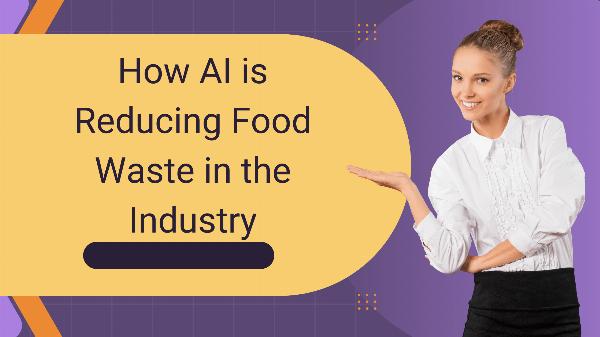How AI is Reducing Food Waste in the Industry

Strong 8k brings an ultra-HD IPTV experience to your living room and your pocket.
Food waste is a significant issue globally, with an estimated 1.3 billion tones of food wasted annually. This waste occurs at various stages of the food supply chain, from production and distribution to retail and consumer levels. The growing concern over this issue has prompted industries to explore innovative solutions, and AI in the food industry is emerging as a key player in addressing these challenges. AI-powered technologies are helping businesses reduce food waste, optimize resources, and improve overall efficiency in food management systems.
The Role of AI in Reducing Food Waste
Artificial intelligence offers a wide array of tools that help in combating food waste by predicting demand, optimizing supply chains, and managing inventory. These technologies can gather and analyze data to identify patterns and make accurate predictions, allowing businesses to make informed decisions that reduce waste.
1. AI in Demand Forecasting and Inventory Management
One of the most prominent applications of AI in the food industry is in demand forecasting and inventory management. Traditionally, businesses often struggle with matching food supply with demand, leading to overproduction or underproduction. AI-based algorithms can analyze past sales data, market trends, and even external factors like weather patterns to predict future demand with remarkable accuracy.
By accurately forecasting demand, companies can reduce the likelihood of over-ordering or producing surplus food, which often leads to spoilage. For example, many supermarkets now rely on AI-driven tools that alert them when stock levels are too high, preventing unnecessary waste. These systems also help restaurants and retailers ensure they have the right amount of stock at the right time.
Benefits: Reduced overproduction and spoilage, cost savings, and improved stock turnover.
Example: AI systems have helped supermarkets reduce food waste by as much as 30%, according to the World Economic Forum.
2. Optimizing the Supply Chain
AI plays a vital role in enhancing the food supply chain by increasing efficiency at various stages, including transportation and distribution. The perishable nature of food products makes the supply chain a critical area where waste often occurs due to spoilage or mishandling. AI can help mitigate this by monitoring and adjusting environmental conditions, such as temperature and humidity, during transportation.
Using real-time data from sensors and predictive analytics, AI systems can optimize routes and schedules, ensuring that food reaches its destination in the freshest possible state. AI-driven platforms can even track expiration dates and prioritize the distribution of items that are closer to spoiling, further reducing waste.
Benefits: Helps in temperature control, predictive maintenance, and route optimization.
Case Study: Wasteless, a company utilizing AI to reduce supermarket food waste, has shown significant reductions in wasted perishable goods through dynamic pricing strategies.
3. AI-Powered Food Waste Management in Restaurants
Restaurants and commercial kitchens are notorious for generating significant amounts of food waste. AI technology offers solutions that help kitchen staff monitor and manage food waste effectively. For instance, AI tools like Winnow’s smart waste meters are designed to track food waste in real-time, providing insights into how much waste is being generated and suggesting strategies to minimize it.
These systems work by using sensors and computer vision technology to identify the types and amounts of food being discarded. This data can then be analyzed to recommend adjustments to portion sizes, menu planning, or ingredient usage. As a result, restaurants can reduce their food waste by up to 40%, leading to cost savings and environmental benefits.
Practical example: Hilton Hotels in the Middle East reduced waste by 600,000 meals with AI-powered food waste solutions.
Benefits: Reduced waste, lower costs, and improved operational efficiency.
Case Studies of AI Reducing Food Waste
1. Supermarkets and Retailers
Supermarkets generate a significant portion of food waste due to overstocking and the perishable nature of many food products. AI technologies are helping retailers minimize this by offering dynamic pricing models. Companies like Wasteless are using AI to adjust prices in real-time based on the freshness of the products. This helps encourage customers to buy items that are nearing their expiration dates, thereby reducing the amount of waste.
Example: Wasteless’s AI-powered dynamic pricing system has led to a reduction in supermarket food waste by a third.
2. Agriculture and Food Production
In the agriculture sector, AI is transforming how crops are grown and harvested, reducing waste at the source. AI tools help farmers make smarter decisions by analyzing data from drones, sensors, and satellite imagery. This data enables precision agriculture practices that minimize crop wastage by ensuring that resources like water, fertilizers, and pesticides are used efficiently.
AI also helps farmers optimize harvesting times, ensuring that crops are picked when they are at their peak, thereby reducing spoilage during storage and transportation.
Benefits: Supports regenerative agriculture, which minimizes the environmental footprint
3. Food Manufacturing
AI is also making waves in food manufacturing, where it is used to monitor production processes, reduce defects, and optimize packaging. Through machine learning algorithms and automation, AI ensures that food products are processed and packaged efficiently, minimizing the risk of spoilage or contamination. This technology is particularly beneficial in quality control, where AI can quickly detect defects or inconsistencies that might otherwise result in wasted food.
Example: AI tools in food manufacturing have improved quality control and reduced waste by detecting defects early in the production process
Impact on Sustainability and Economy
We can not understate the environmental impact of food waste. Reducing food waste plays a crucial role in achieving sustainability goals, such as those outlined in the UN’s Sustainable Development Goals. AI is a powerful tool that can help transition the food industry from a linear to a circular model, where waste is minimized and resources are used efficiently.
Economically, AI-driven food waste reduction presents a massive opportunity. According to McKinsey, AI has the potential to generate up to $127 billion in annual value by reducing food waste and improving resource management
The benefits extend beyond cost savings, as businesses that adopt AI solutions also contribute to environmental conservation and corporate social responsibility.
Economic benefits: Increased efficiency, cost savings, and a more sustainable food system.
Benefit: AI aligns with global efforts to cut food waste by 50% by 2030.
Future of AI in Food Waste Reduction
As AI technologies continue to evolve, their applications in the food industry will expand. Future advancements may include AI assistants that offer real-time insights to kitchen staff, more sophisticated demand forecasting models, and advanced monitoring systems that further reduce waste. These innovations will be instrumental in helping the global food system become more sustainable and efficient.
Conclusion
AI in the food industry is proving to be a game-changer in the fight against food waste. From improving demand forecasting and supply chain management to offering real-time waste management solutions in kitchens, AI is enabling businesses to make smarter decisions that reduce waste, save costs, and contribute to sustainability goals. As more companies adopt these technologies, the food industry will be better equipped to tackle one of its most pressing challenges—food waste.
Note: IndiBlogHub features both user-submitted and editorial content. We do not verify third-party contributions. Read our Disclaimer and Privacy Policyfor details.


